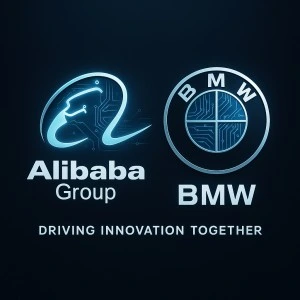Alibaba and BMW Team Up to Make Cars Smarter in China
In a move that’s got everyone talking, Alibaba Group and BMW are joining forces to bring some seriously cool AI tech to cars in China. This isn’t just about making cars fancier—it’s about making them smarter, safer, and way more fun to drive. For Alibaba, it’s a chance to cash in on its cutting-edge tech and reach even more people. And for BMW? It’s all about keeping up with China’s love for high-tech rides.
What’s The Plan?
Let’s break it down. Alibaba is the tech giant behind stuff like cloud computing, big data, and AI wizardry. BMW, on the other hand, knows how to make sleek, luxurious cars that people drool over. Put those two together, and you’ve got a recipe for some next-level car tech. The idea is to create systems that make driving easier, safer, and tailored to each driver’s preferences. Think of it as giving your car a brain—and a personality.
For Alibaba, this is another step toward turning its tech into real-world products people can use every day. Sure, they’re already huge in e-commerce, but they’re also diving into things like self-driving cars and smart cities. Partnering with BMW lets them tap into China’s booming car market, which is one of the biggest in the world.
As for BMW, they know that Chinese drivers are all about tech. Whether it’s voice controls, AI helpers, or seamless smartphone integration, people in China want their cars to feel futuristic. By teaming up with Alibaba, BMW is showing they’re ready to keep up with these demands and stay ahead of the curve.

Sounds Exciting? Read here, Alibaba teams up with BMW to develop AI for cars in China
What’s Actually Happening?
So, what kind of cool stuff are they working on? Here’s the lowdown:
- Voice Assistants That Actually Work : Remember those frustrating voice commands that never seem to understand you? Well, Alibaba’s Tmall Genie Auto is here to fix that. Imagine telling your car, “Hey, find me a coffee shop,” or “Turn up the AC,” and it actually listens. No more fumbling with buttons while you’re trying to drive.
- Cars That Know You Better Than You Know Yourself : Thanks to Alibaba’s massive data and AI smarts, your BMW could soon feel like it was made just for you. It might remember your favorite seat position, play your go-to playlist, or even suggest restaurants you’d love—all without you lifting a finger.
- Smarter Navigation : Traffic in China’s big cities can be brutal. To help with that, Alibaba Cloud will power navigation systems that give real-time updates and even predict traffic jams before they happen. No more wasting time stuck in gridlock.
- Self-Driving Dreams : While fully autonomous cars are still a ways off, this partnership is pushing hard to make them a reality. Picture a car that can handle itself in tricky situations, make quick decisions, and keep you safe no matter what.
- Greener Rides : With China going all-in on sustainability, the two companies are also looking at ways to make cars more eco-friendly. For example, AI could help optimize fuel efficiency or reduce emissions by tweaking how the engine runs in real time.
Why China?
China’s car scene is changing fast. The government is pushing hard for electric vehicles (EVs), and more people than ever are buying cars packed with tech features. In fact, China accounts for nearly half of all EV sales worldwide. That makes it the perfect place to test out new ideas and see what sticks.
And let’s not forget—Chinese buyers aren’t just looking for speed or style anymore. They want cars that connect to their digital lives. Streaming music, managing schedules, controlling smart home gadgets from the road—it’s all part of the package. By teaming up with Alibaba, BMW is betting big on understanding what Chinese drivers really want.
Did you miss GTC updates? Read Here, Nvidia Unveils Rubin Architecture at GTC 2025
What’s Challenges?
Of course, it’s not all smooth sailing. One big concern is privacy. Connected cars collect tons of data about where you go, what you do, and even how you drive. Making sure that info stays safe and isn’t misused is going to be a top priority.
There’s also stiff competition. Companies like Tesla, NIO, and Xpeng are already making waves with their own smart car tech. If Alibaba and BMW want to stand out, they’ll need to keep innovating and stay ahead of the game.
Finally, there’s the challenge of making this tech affordable. High-end models might get all the bells and whistles, but bringing these features to cheaper cars will take some serious effort.
What’s Next?
Despite the hurdles, this partnership has huge potential. If everything goes according to plan, we could see some game-changing tech hitting the roads in China—and maybe even around the world—sooner than you think. And who knows? This could inspire other tech companies and carmakers to follow suit, leading to an entire generation of smarter, greener, and more personalized vehicles.
Bottom line? The future of cars is looking pretty exciting. With Alibaba and BMW leading the charge, we’re closer than ever to having cars that don’t just take us places—they make the journey better too. So buckle up—this ride’s just getting started!
